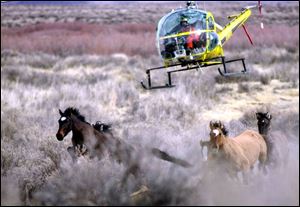
50 wild horses up for sale
10/7/2005
This file photo from Jan. 30, 2004, shows a helicopter helping to herd some wild horses in a roundup near Lahontan, Nev.
DELPHOS, Ohio - It starts in a quiet corner of the stall, with you perched atop a five-gallon bucket.
You sit. You talk, low and soo-thingly.
Days pass, weeks perhaps. Then all that talking takes a turn. Toward the first hint of trust.
A velvety muzzle, the color of a rain-washed buckeye, reaches out for a bit of hay, held oh-so-steady in your hand. The bonding begins, builds, and for folks like Denny Phalen, a self-described, old-fashioned cowboy, there's no turning back.
For nearly 15 years, wild horses have held his heart.
"There's just something about the mustang," he said. "Something you find in them that you won't find in other horses."
Mr. Phalen, who lives near Lima, has tamed nearly a dozen mustangs, all of which were adopted through the U.S. Bureau of Land Management's wild-horse adoption program.
This weekend at Sarge's Sale Arena near here, the bureau will conduct its first adoption event in northwest Ohio, offering to the public about 50 mustangs from Nevada and other Western states.
Expect a stampede of interest in the animals.
Don Sargent, who owns the sale arena, has been fielding calls from people in the tristate area. "We've had a huge response."
The horses will be available for viewing from 1 to 5 p.m. today. Scheduled adoption hours are 8 a.m. to 5 p.m. tomorrow and 8 a.m. to noon Sunday at the arena, State Rt. 309 and Defiance Trail, 3 miles east of Delphos.
The adoption fee is $125 per horse. Horses will be adopted by lottery system with remaining animals available on a first-come, first-served basis through noon Sunday, said Jim Boylan, spokesman for the BLM-Eastern States Milwaukee field office. After caring for an animal for one year, the adopter is eligible to receive title, or ownership, from the federal government, he said.
If you want a horse, you must fill out an application- a 15-20 minute process that can be done at the arena - and meet several requirements related to transportation, shelter, and means of caring for horses. Compliance checks are conducted within the first year after the adoption to make sure everything is OK, Mr. Boylan said. "We realize it is a big undertaking."
Adoption doesn't always lead to greener pastures. Diana Murphy, president and founder of Voice for Horses Rescue in Toledo, said her organization has found new homes for many horses adopted through BLM.
"People who have adopted and decided it was too much for them and they do not want them anymore - we end up with them.
"It's a hard job to train a wild horse," she said. "You have got to have the time for them. They are wonderful horses once they get trained."
BLM has placed more than 178,000 wild horses and burros into private care since 1973. It manages the animals under the authority of the 1971 Wild Free-Roaming Horses and Burros Act that has been amended three times, most recently last December. The amendment allows for the sale for slaughter of some older and unwanted horses captured during government roundups aimed at reducing the wild population. The move has brought a backlash from activists who want to reinstate full protection for the mustangs.
Tom Gorey, a BLM spokesman, said that BLM has not sold any horses at public auctions and none have been sold to "killer agents or slaughterhouses".
Through the years, BLM has come under fire for rounding up horses that were born to be wild.
Some complain that horses adopted through the BLM program wind up at slaughterhouses. Mr. Boylan said that is a concern, but "we have a very credible program" that places horses in good homes with good people.
Mr. Gorey said that according to widely reported figures, an estimated 50,000 to 60,000 domestic horses are slaughtered a year in the United States. Less than 600 of those are horses that had been adopted through the BLM program, he said.
At first, Mr. Phalen, the Lima area cowboy, saw the adoption program as a "cheap way to get a horse." And then he tamed his first one, a magnificent animal named Storm.
"He's pretty well known in a broad area up here. People are totally amazed when they see my 7-year-old riding around on him."
Mustangs are such a hearty, bonding animal, he said. Strong, and fiercely loyal. Several friends have adopted wild horses too.
"It takes a lot of time to tame them, but the rewards are greater than the time it takes to tame one," said Mr. Phalen, who won't be attending the adoption event this weekend. He's going horseback riding.
"When it comes to riding the trail, I would rather be on a $125 mustang than a $50,000 Quarter horse."
Contact Janet Romaker
at: jromaker@theblade.com
or 419-724-6006.